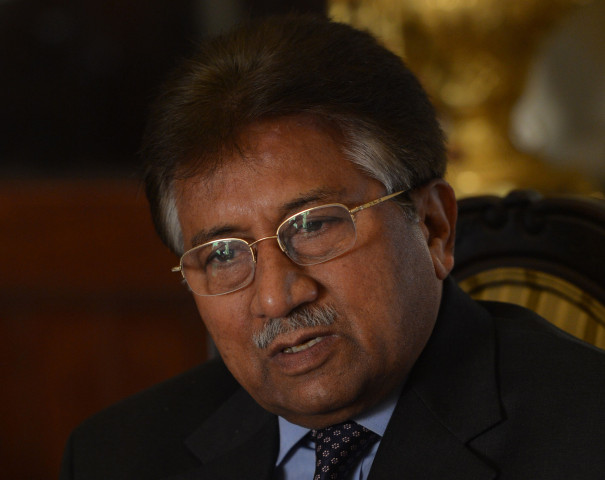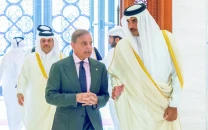SC terms November 3 emergency a violation of Constitution
Musharraf's counsel said SC's Jul 31, 2009 verdict declared it unconstitutional, but not a breach of the...

Musharraf's counsel said SC's Jul 31, 2009 verdict declared it unconstitutional, but not a breach of the Constitution. PHOTO: AFP/FILE
The 14-member large SC bench headed by the Chief Justice heard the review petition filed by former president Gen (retd) Pervez Musharraf against the SC verdict. The court maintained the sacking of senior court judges and other actions taken by Musharraf under the banner of an 'emergency' rule as null and void.
During the course of the proceedings, the petitioner's counsel Ibrahim Satti apprised the court that Gen (retd) Musharraf was given the right to make amendments in the Constitution, following which, changes were made in more than 100 articles of the Constitution.
Satti maintained Musharraf had issued a new oath for judges following the Provisional Constitutional Order (PCO) of 2000, and former chief justice Iftikhar Muhammad Chaudhry was among the judges who took their oath under the PCO.
Musharraf's counsel challenged that while the July 31 verdict had declared the proclamation of emergency as unconstitutional, it did not state that the step was equal to breaching the Constitution.
He said a reference was also filed against the ex-chief justice on March 9, 2007 while the SC ordered to restore Iftikhar Chaudhry on July 20, 2007.
After the restoration of former CJ, the referring authority did not file a review petition, he added.
Satti argued that the original draft of the PCO was not made apart of the court's order.
On this, Chief Justice Jillani inquired about the content of the original draft. Satti replied that emergency was imposed on November 3, 2007 after consulting the armed forces and Chief of the Army Staff.
Governors, corps commanders and Chief of the Army Staff were on board regarding the decision, he added.
The counsel said the emergency was proclaimed on November 3, 2007 due to a situation similar to that on October 12, 1998.
However, all institutions except the judiciary were functioning as per routine on November 3.
The court then asked "whether the emergency was imposed for the judiciary only," to which Musharraf's counsel replied: "Unfortunately that is true."
The lawyer said his client had not been given the right to present his stance in the court.
"Was he unaware of the case?" asked Justice Jawwad. "He knew but was not in a position to appear before the court," said the counsel.
Ibrahim Satti told the court that former prime minister Shaukat Aziz had apprised Pervez Musharraf through a letter that the country was going through a constitutional crisis.
Satti said when the case was initiated, Musharraf was not a party to the case. The Attorney General gave a statement on behalf of the Federation that the government did not support the November 3, 2007 steps.
The Chief Justice remarked that the parliament did not endorse the steps taken on November 3, 2007. Ibrahim Satti told the court that Pervez Musharraf had received the notice for appearance on April 22, 2009 but he was in London due to the threats he had received from Taliban.
The court adjourned the hearing for Wednesday and directed Ibrahim Satti to complete his arguments till 11:30 am.



















COMMENTS
Comments are moderated and generally will be posted if they are on-topic and not abusive.
For more information, please see our Comments FAQ